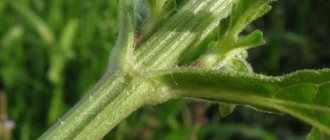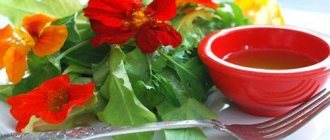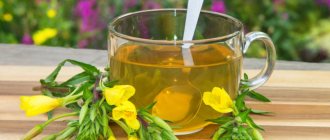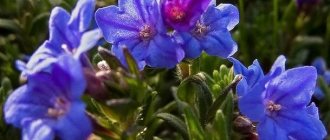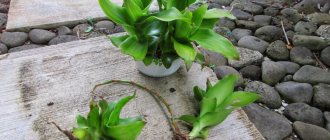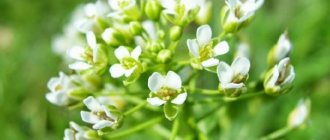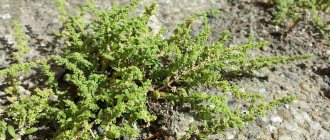Diarrhea can take you by surprise or last for weeks. In any case, diarrhea is an unpleasant and even dangerous disease. It can lead to complete dehydration, disruption of blood composition and failure of internal organs. And you will have to completely forget about the planned things.
Under no circumstances should you wait until it “goes away on its own.” If you don’t want to swallow pills right away, homeopaths recommend taking herbal infusions. Zopnik, for example, will not only relieve unpleasant symptoms, but also heal inflamed intestines.
Description of the plant
Zopnik is a genus of herbaceous perennial plants of the Lamiaceae family. The height of an adult plant reaches 60-120 cm. Violet-purple stems along the entire length are covered with gray felt hairs. The basal large light leaves grow up to 12 cm in length, and small dark green leaves covered with gray down grow along the entire stem. In June-July, spike-shaped inflorescences bloom at the tops of the stems, which are 1.5-2 cm apart from each other. The inflorescences end in a beautiful corolla. There are corollas of pink, lilac, purple or yellow. Zopnik is found in the temperate climate of the steppe regions of Europe and Asia. Other names: iron ore, initial letter.
In total, there are about 100 species of this herb, but in folk medicine two types of zopnik are used: prickly and tuberous. The most valuable medicinal raw material is the above-ground part of the plant, collected during the flowering period. The following were found in the composition of medicinal raw materials:
- flavonoids: apigenin, luteolin, genquanin;
- tannins (up to 4.5%);
- vitamins E, K, C, B2;
- essential oils;
- iridoids;
- phytosterols;
- organic acids: caffeic, chlorogenic, ferulic, quinic.
The seeds contain up to 28% fatty oils.
Contraindications for use
Not everyone can use zopnik, and before starting treatment with this herb, you need to familiarize yourself with the contraindications. If a person has at least one of them, the help of this wonderful natural healer should be abandoned. It is unacceptable to take risks and still use the plant for medicinal purposes, since there is a high probability of causing serious harm to your body instead of benefiting it.
- Zopnik is strictly contraindicated for pregnant and lactating women;
- patients suffering from blood clots;
- people with low stomach acidity, advanced hypertension and constipation.
The plant should not be used if it is individually intolerant.
Give zopnik to children with caution. In this case, before use, it is advisable to consult a doctor who will select the dosage and determine the duration of treatment.
For everyone else (subject to the dosage), zopnik will become a faithful assistant in the fight against various diseases.
Beneficial features
Most of the medicinal properties of the herb zopnik are due to the presence of iridoids in the composition of medicinal raw materials. Iridoids are biologically active compounds that comprehensively improve human health. Unlike other active ingredients and most vitamins, they are not destroyed by temperature and do not lose their properties over time. It has been scientifically proven that iridoids are able to resist the growth of malignant tumors, extinguish inflammatory processes in the body, and stimulate brain activity. In addition, these active components improve the functioning of the endocrine glands and enhance immunity.
The presence of tannins gives iron ore grass astringent and carminative properties. Vitamin K in the composition increases blood clotting and promotes the formation of red blood cells. Vitamins C and E increase immunity, improve skin condition and prevent premature aging. Thanks to its miraculous multicomponent composition, the medicinal herb has the following effects on the body:
- diuretic;
- choleretic;
- anti-inflammatory;
- vasoconstrictor;
- immunomodulatory;
- pain reliever;
- antispasmodic;
- hemostatic;
- antifungal;
- sedative.
Application and medicinal properties
Possessing such components, iron ore is able to treat many diseases. All parts except the root and rhizome are used in medicine. Based on zopnik, decoctions, compresses, tinctures, solutions and ointments are made. They act on the body as follows:
- diuretic effect;
- choleretic;
- expectorant;
- anti-inflammatory;
- vasoconstrictor;
- tonic;
- soothing;
- immunostimulating and others.
Due to the presence of iridoids in the composition, preparations based on this plant have a complex effect on the body’s condition: blood clotting increases, blood vessels are cleansed, bleeding stops (including heavy discharge during menstruation), blood pressure is normalized and blood vessels constrict.
It has a good effect on the gastrointestinal tract: restores appetite, relieves stomach pain, normalizes metabolism. People with gastritis who took decoctions have a noticeable decrease in acidity. In addition, decoctions relieve symptoms of gastritis and help with stomach ulcers. It is generally accepted that zopnik also helps people suffering from hemorrhoids.
It has positive effects on the nervous system: reduces stress, relieves nervousness, restores daily routine, and normalizes sleep. Providing a tonic effect, it relieves insomnia and chronic fatigue. Relieves headaches and dizziness.
Decoctions and lotions help with diseases such as arthritis and rheumatism. In addition, the grass has an antiseptic effect, so it is used for wounds and scratches to prevent dirt and infection.
Rinse solutions are suitable for respiratory diseases: they are used to treat bronchitis, severe cough, tuberculosis and pneumonia.
Contraindications
With such an impressive list of medicinal properties, the herb of zopnik (tuberiferous and prickly) also has a list of contraindications.
Zopnik should not be prescribed in any form for:
- increased blood clotting and susceptibility to thrombosis;
- chronic constipation;
- hypertension;
- bronchial asthma;
- pneumonia;
- pregnancy;
- under the age of 12;
- hypersensitivity or allergy to components.
The range of uses of this medicinal raw material is so wide that it requires adjustment of the dose, concentration and course of administration for each disease. In addition, for any disease, medications are prescribed, the compatibility with which must also be taken into account. Therefore, herbalists strongly recommend not to self-medicate, and to consult with your doctor in advance.
Application
For stomach pain, women's diseases, coughs, colds, use a decoction of the herb Zopnik tuberiferous or 10% alcohol tincture. All medications containing zopnik are taken 30-40 minutes before meals.
For the decoction, you need to buy raw materials at the pharmacy, pour 2 tbsp. l. a glass of water, simmer for 15 minutes in a water bath and leave for 45 minutes. It is recommended to drink 50 ml per dose. The alcohol tincture is infused for 20 days (10 g of dry raw materials per 100 g of alcohol), taken 3 times a day, 20 drops each.
Zopnik for thyroid diseases
For thyrotoxicosis, sick people are recommended to drink a water infusion of zopnik. The product is prepared at the rate of 1 tsp. per glass of boiling water and take during the day in 3-4 doses.
For pancreatitis
Zopnik has choleretic properties; it is used both independently and as part of herbal mixtures for the treatment of pancreatitis. You need to take the decoction three times a day 30-40 minutes before meals for a month, then take a break.
Zopnik tuberiferous for gastritis and heartburn
The best reviews about zopnik decoction are used as a pain reliever for heartburn and gastritis. All classic recipes are recommended for increased gastric secretion, but, according to some herbalists, zopnik normalizes acidity, so it can also be used for decreased secretion.
To prepare the decoction, you need to cook tuberous zopnik for 10-15 minutes in a water bath in the proportion of 4 tbsp. l. for 500 ml of water. Let stand for 30 minutes, drink a third of a glass 3 times a day for a month.
For hemorrhoids
For rectal bleeding, an infusion of the herb zopnik helps well. To prepare the infusion, you need to infuse the product for 4 hours, per 1 tbsp. l. tuber powder - 1 glass of water, take 2 tbsp. l. for the reception.
Herb Zopnik tuberiferous for bronchitis, pneumonia and tuberculosis
For a debilitating cough or bronchitis, a cold water infusion of zopnik will help, which should be taken 1 tablespoon diluted in half with water. For infusion you will need 5 tbsp. l. herbs and 500 ml of water. Keep for at least 14 days.
Helpful information
- In cosmetology, iron ore decoctions are used to treat acne, acne, and also to lighten spots that remain after acne treatment.
- In gardening, the unpretentious zopnik is often used to decorate alpine slides. In just a few years, it manages to cover a large area with a beautiful carpet of lush green leaves, and for a long time pleases its owners with bright fragrant flowers.
- In cooking, small tubers of the plant are used boiled or fried as side dishes. The leaves are sometimes used as a seasoning for meat dishes or in marinades.
Zopnik tuberiferous: medicinal properties and use in medicine
What diseases is this plant used to treat?
- The herb Zopnik tuberiferous is used to treat bladder papilloma.
- A decoction and tincture of this plant is used for gastritis and ulcers.
- Preparations based on Zopnik tuberifera enhance immunity and promote speedy recovery from various diseases.
- Powder from the root of the plant is used to treat open wounds and skin lesions.
- Freshly squeezed juice of Zopnik tuberiferous saturates the body with useful elements and is used for vitamin deficiency and anemia.
- Medicines containing this medicinal plant are prescribed for bronchitis, tracheitis, and colds.
- Tinctures of zopnik tuberiferous have a calming and analgesic effect. They are used for coughs and diseases of the female genital area. It is recommended to give such tinctures to children who often suffer from headaches.
How to collect a plant
Experienced herbalists know that iron ore actively absorbs and accumulates toxins and harmful substances from the soil and air. Therefore, the herb is collected for medicinal purposes away from big cities, highways and industrial zones. Those who have long used its healing properties grow the plant in their gardens.
Collection rules:
- The time for harvesting shoots is during the flowering period. The roots are harvested in September.
- Side shoots that are not too thick are cut off with scissors and immediately laid out on a spread tarpaulin for drying.
- On the same day, the collected raw materials are transferred under the canopies, distributed over a spread cloth in a thin layer and dried, constantly turning over.
- Raw materials are stored in opaque containers (preferably in canvas bags) for a year.
Share in the comments whether you found the information about the healing properties of zopnik herb interesting and useful.
Preparation of tuber-bearing zopnik
This plant is harvested during the flowering period. After cutting into pieces, the tuber-bearing zopnik is placed on a tray and placed in a well-ventilated room, where it dries for several weeks. It needs to be turned over daily.
After the plant has dried, it is placed in linen, cotton or paper envelopes. For further storage it is necessary to transfer to a dry room.
But the tubers are harvested in the fall. Having dug up and shaken the soil, they are washed under running water and cut into rings. To make the roots dry faster, they are placed in an automatic dryer. The temperature should not exceed 50 degrees. Dried tubers are stored in cardboard boxes in a dry place.
The shelf life of zopnik grass does not exceed 2 years, and tubers - 3 years.
A common plant that can be found in the steppe. Some will call it a weed, others - a beautiful flower. However, each herb has unique medicinal properties that traditional medicine does not use. And in the alternative, every plant will find its place.
Contraindications and side effects
Zopnik has a number of contraindications. It should not be taken if:
- pregnancy;
- lactation:
- allergies;
- individual intolerance;
- hypertension;
- pneumonia;
- children under 7 years old.
This list of contraindications consists of general instructions. Iron ore has a strong effect on the body and cannot be prescribed individually.
